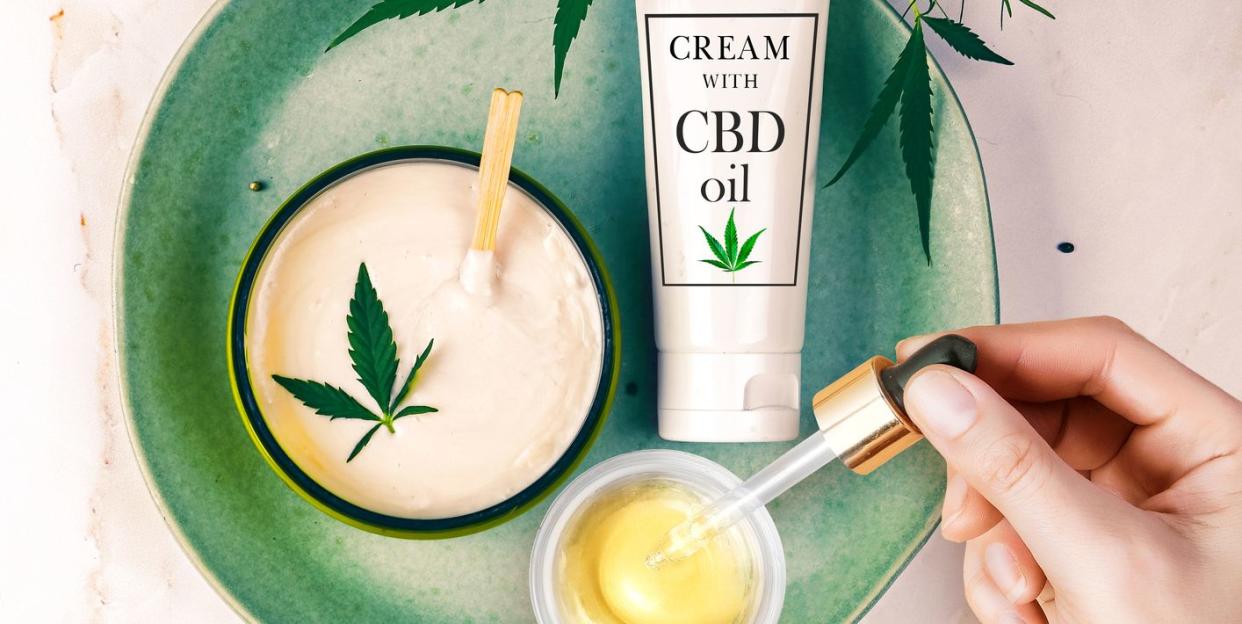Everything You Need to Know About CBD Skincare

You've likely noticed that CBD — which stands for cannabidiol, a compound found in cannabis plants — has started to make its way into skincare, with the buzzy ingredient cropping up in everything from moisturizers to deodorant (yes, deodorant!). While once-niche CBD might be ubiquitous these days, chances are, you still have a lot of questions about it.
"Most CBD products are marketed for general relaxation purposes," says DiAnne Davis, M.D., FAAD.. You've probably heard of CBD helping a wide variety of different ailments — it's been touted to help relieve seizures, ease migraine pain, reduce anxiety, and more — so what's it doing in your skincare? Dermatologists and our Good Housekeeping Beauty Lab scientists explain.
What does CBD do for your skin?
It's a little murky. "While the FDA has approved a purified form of CBD as a prescription drug for two severe seizure disorders, there's very limited data on the safety CBD as used in consumer products including cosmetics and foods," says Birnur Aral, Ph.D., director of the Good Housekeeping Institute Beauty Lab. Some of the preliminary findings on CBD skincare benefits are:
It can reduce inflammation. "There has been some research to indicate that CBD can have positive effects on combatting skin inflammation, acne, eczema, tissue scarring and even melanoma," says Aral. CBD also contains terpenes, which could be useful in skincare. "There is some research to indicate that [terpenes] can have anti-inflammatory and antioxidant benefits on skin," says Aral.
It may relieve itchy skin. "Current research shows the most promise for cannabinoids in the treatment of itch," Dr. Davis says. "All of this research is in the very early stages so there is not concrete evidence available yet for us to interpret."
It may help treat psoriasis, atopic dermatitis, and other medical conditions of the skin, but more evidence is needed for these benefits: "Most of these benefits fall under a medical benefit and generalizing CBD as being 'good for skin' is premature," says Aral.
Are there any side effects to CBD in skincare?
First and foremost, it can't get you high. "CBD is a derivative of the marijuana plant," Dr. Davis. "Marijuana contains THC, which produces the psychoactive effects." Marijuana can contain 17–28% THC, while CBD contains much lower levels. "The CBD hemp extracts from reliable sources have THC levels less than 0.3%, which makes them non-intoxicating," explains Aral.
"[The] FDA advises that consumers consult with their healthcare providers before they start using any products containing CBD, as it is questioning side effects that can result from long term use such as liver damage or interactions with other drugs that a person is taking," Aral says. "These concerns include skincare products, as how much CBD is absorbed through the skin is not well established."
Are CBD skincare products safe?
"While the 2018 Farm Bill removed hemp extracts from the definition of marijuana in the Controlled Substances Act, CBD products are still subject to the same laws and requirements as FDA-regulated products," Aral explains. However, Dr. Davis says that "findings from CBD studies indicate that some products may not actually contain the amount of CBD listed on the package."
Moreover, some products contained a good amount of THC, says Dr. Davis. While you cannot get high from applying a lotion or lip balm, this finding suggests it can be difficult to know exactly what you’re getting when you buy a product that contains CBD. As Aral noted, since there's such limited data on CBD's safety in consumer products like skincare, at this time, neither Dr. Davis nor the Good Housekeeping Institute recommend CBD skincare products.
How can I decode CBD claims?
There are so many CBD products out there that it can be confusing to sort through them all. If you do decide you want to give CBD skincare products a try, these are some of the most common terms you may find on a label, decoded by our experts (though keep in mind, these terms are not legally regulated):
"Full-spectrum" refers to extracts that contain mostly CBD, but also have minor cannabinoids (this can include THC). These are usually only present at 1% or less. If THC is present in this low amount, it will not alter the mind. These cannabinoids may even be important to include, since they're believed to all work together.
"Broad-spectrum" means that THC has been removed to the lowest practical quantity. This is likely to make sure it can meet legal requirements across countries and states, as they vary greatly.
"Isolate" is the purified crystal precipitate form of CBD, an extremely pure version of CBD. Unlike most versions of CBD, an isolate does not contain any THC.
"Sustainably sourced" is a vague way to describe CBD (or any crop), according to Aral. "To understand if a crop is sustainable raised and harvested and extracted, the manufacturer needs to show that they have minimized energy and water use and waste generation, among other things," she explains. "Therefore, without proper vetting of the manufacturing and distribution practices, it is unlikely that a lay consumer will be able to discern if one CBD extract is made more sustainably than another." TLDR: Don't buy into this claim.
You Might Also Like


